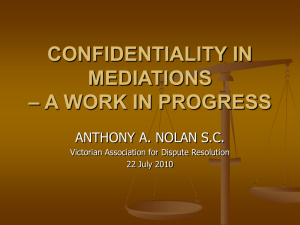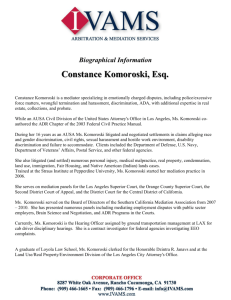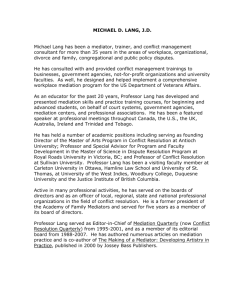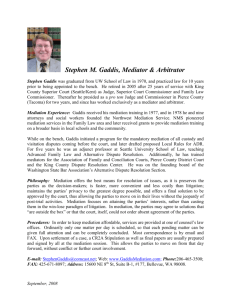Conference Co-Chairs Sharon Daly, Office of Dispute Resolution
advertisement
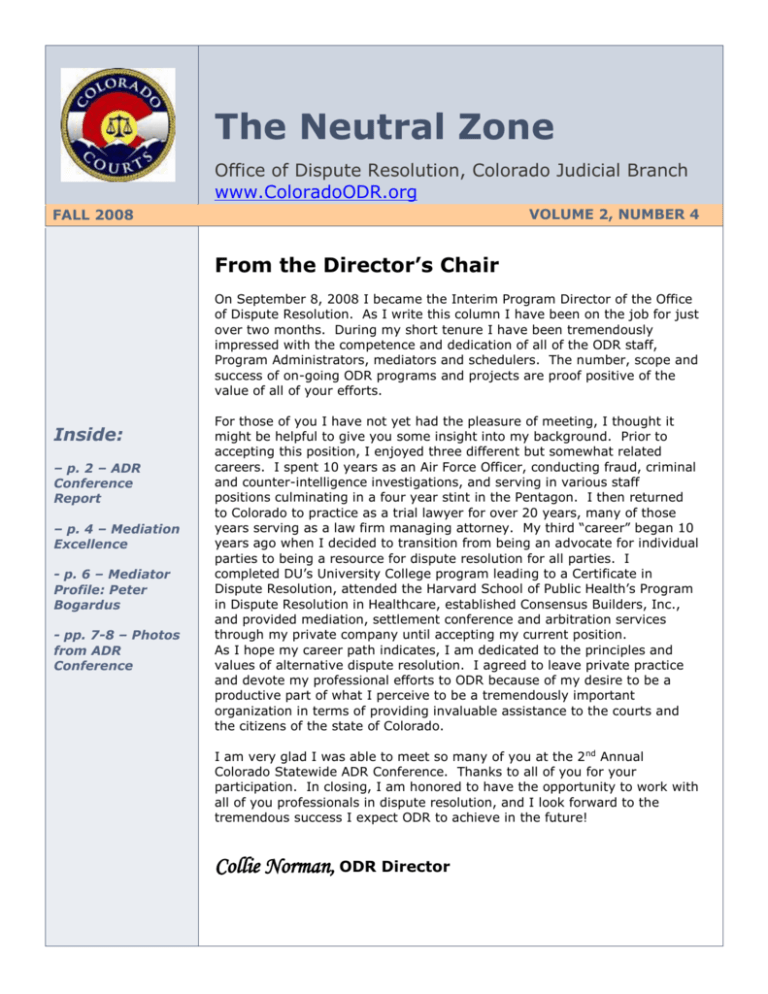
The Neutral Zone Office of Dispute Resolution, Colorado Judicial Branch www.ColoradoODR.org VOLUME 2, NUMBER 4 FALL 2008 From the Director’s Chair On September 8, 2008 I became the Interim Program Director of the Office of Dispute Resolution. As I write this column I have been on the job for just over two months. During my short tenure I have been tremendously impressed with the competence and dedication of all of the ODR staff, Program Administrators, mediators and schedulers. The number, scope and success of on-going ODR programs and projects are proof positive of the value of all of your efforts. Inside: – p. 2 – ADR Conference Report – p. 4 – Mediation Excellence - p. 6 – Mediator Profile: Peter Bogardus - pp. 7-8 – Photos from ADR Conference For those of you I have not yet had the pleasure of meeting, I thought it might be helpful to give you some insight into my background. Prior to accepting this position, I enjoyed three different but somewhat related careers. I spent 10 years as an Air Force Officer, conducting fraud, criminal and counter-intelligence investigations, and serving in various staff positions culminating in a four year stint in the Pentagon. I then returned to Colorado to practice as a trial lawyer for over 20 years, many of those years serving as a law firm managing attorney. My third “career” began 10 years ago when I decided to transition from being an advocate for individual parties to being a resource for dispute resolution for all parties. I completed DU’s University College program leading to a Certificate in Dispute Resolution, attended the Harvard School of Public Health’s Program in Dispute Resolution in Healthcare, established Consensus Builders, Inc., and provided mediation, settlement conference and arbitration services through my private company until accepting my current position. As I hope my career path indicates, I am dedicated to the principles and values of alternative dispute resolution. I agreed to leave private practice and devote my professional efforts to ODR because of my desire to be a productive part of what I perceive to be a tremendously important organization in terms of providing invaluable assistance to the courts and the citizens of the state of Colorado. I am very glad I was able to meet so many of you at the 2 nd Annual Colorado Statewide ADR Conference. Thanks to all of you for your participation. In closing, I am honored to have the opportunity to work with all of you professionals in dispute resolution, and I look forward to the tremendous success I expect ODR to achieve in the future! Collie Norman, ODR Director Report from the 2nd Annual Statewide ADR Conference – “Excellence in Dispute Resolution” – and other topics! By Sharon Daly, ODR Projects Manager 2nd Annual Colorado Statewide ADR Conference By all accounts, Colorado’s 2nd Annual Statewide ADR Conference was impressive - 375 colleagues (up from 325 in 2007) sharing their insights, experiences, and questions about ADR issues. Attendees repeatedly remarked about the diversity of the conference sessions, the fabulous luncheon keynote, the high quality presentations in the 24 breakout sessions, and the opportunity to network. This year’s breakout sessions featured family, civil, employment, restorative justice, community mediation, ADR law and profession, skills and ethics. New this year were sessions on evaluative mediation and settlement conferences, arbitration, and hybrids of mediation and evaluative approaches such as Early Neutral Assessment and Parenting Coordination/Decision Making in family cases, and collaborative law in business cases. The wide range of styles and processes made for a rich array of choices. The listing of presenters from the Judicial Department included the Honorable Edward Moss, 17th JD; the Honorable Stephen Munsinger, 1st JD; Court Administrator Melinda Taylor, 17th JD; Family Court Facilitator Janet Lee, 17th JD; ODR Program Administrators Trish Elledge, 18th JD, and Sue Taigman, 20th and 1st JD; Probation Officer Bernadette Martinez Felix, 8th JD; ODR neutrals Ken Jaray and Christine Coates; and ODR trainer, Robert Smith. Other presenters included numerous former judicial officers and other attorney and non-attorney experts in the field. Opening speaker Ray Lanier directed the audience to a report submitted to the President of the United States regarding the growth in use of ADR in the federal sector. Mr. Lanier noted that given the current economic climate, the report’s documented substantial cost savings, increase in workforce productivity and accountability, timely achievement of agency goals, and delivery of reliable and efficient service, may provide a helpful analysis for those facing possible cutbacks in ADR programs. See the report at http://www.usdoj.gov/adr/pdf/iadrsc_press_report_final.pdf . Ambassador Dennis B. Ross, as the luncheon keynote, shared his insight into what it takes to be an effective (and not necessarily neutral) mediator in high stakes international conflict. With a touch of humor and fascinating stories of mediating Israeli-Palestinian peace talks, he identified familiar qualities such as patience, good listening skills, risk taker, and others. Page 2 In a surprise appearance, Chief Justice Mary Mullarkey presented awards on behalf of the ADR Conference Planning Committee to former ODR Director Cynthia Savage and to Jerry Lockwood of the Judicial Arbiter Group, Inc. in recognition of the 25th Anniversary of the Colorado Dispute Resolution Act. The Chief Justice eloquently introduced these two individuals who are significant contributors to the advancement of ADR in Colorado, and who have been instrumental in the establishment of the annual Colorado Statewide ADR Conference. Representatives of the Navajo Nation Judicial Branch Peacemaking Program explained their program which started in 1982 as an alternative to trial. A variety of case types are referred – family, divorce, child support, abuse and neglect, criminal, probate, land issues, and other civil matters. The demonstration highlighted the similarities to mediation and to restorative justice processes by including the extended family members in the process, by allowing the parties to fully express their concerns and to identify restitution and healing for both parties and the families involved in the conflict. For more, see http://www.navajocourts.org/index5.htm The session on using alternative processes for probate was also a highlight. Retired Judge John Maher, former Administrative Probate Judge for New Hampshire, shared his experiences in using interest-based mediation in probate cases which are often driven by family dynamics that may be best addressed through interest-based solutions not available to the courts. The Honorable Stephen M. Munsinger, District Court Judge in the 1st Judicial District, and others from Colorado participated on the panel. Judge Munsinger identified opportunities for mediation as well as the use of Special Masters for Colorado’s probate cases. ODR Program Administrator, Sue Taigman, organized and facilitated the panel. This year also brought in more representation from the ADR community, not only as presenters, but also as sponsors. The American Arbitration Association and Regis University joined last year’s sponsors including Judicial Arbiter Group, Inc., DU Conflict Resolution Institute, and the Center for Dependency, Addiction & Rehabilitation. The Colorado Judicial Institute, CBA ADR Section, and CCMO contributed to 22 scholarships. Cindy Savage and Chief Justice Mary Mullarkey at Conference [See more Conference photos on pages 7 and 8 of The Neutral Zone] Child Support Enforcement Problem Solving Court Site Visit to Model Court in North Carolina Page 3 On November 3rd, Magistrate Kara Martin, 18th JD, and Magistrate Babette Norton, 1st JD shared with other judicial officers and ODR program administrators, their impressions of the child support enforcement problem solving court model practiced by Judge Kristin Ruth in Wake County, NC, and the implications for Colorado. Magistrates Martin and Norton were part of a Colorado delegation that also included SCAO CSE Coordinator, Maureen Leif, ODR Projects Manager, Sharon Daly; Diane Degenhart, Federal Office of Child Support; a IV-D attorney, an administrator and a court team supervisor from Jefferson County; and a IV-D attorney from Arapahoe County. The group observed court proceedings for the regular IV-D docket and the specialized IV-D drug court docket. Representatives of partner organizations described their roles. These included IV-D agency representatives, electronic monitoring providers, a follow-up drug treatment provider, the “Get It Right” director providing community college class for obligors in jail. The group also visited “Working For Kids,” a comprehensive employment program which also provides support groups addressing parenting, budgeting, and anger management issues in addition to employment support. For more information contact Maureen or Sharon. AFCC Parenting Education Symposium, Albuquerque, NM Bob Smith, Cindie Farmer, and Sharon Daly participated on a panel with Tracie Pogue, the federal Access and Visitation Grant coordinator, on a model of how to use A&V Grant funds to establish parenting education programs in rural areas. Cindie took center stage in her description of the program she has developed in Lamar, Colorado based on the curriculum developed and training provided by Bob Smith, when he was the ODR Projects Manager, using the federal A&V Grant funds. The program in the 15th JD addresses a number of issues that have been difficult for rural programs - which curriculum, identifying trainers, reporting to judges, time and place offered, domestic violence precautions and protocols. Upcoming Training of Interest: PC/DM Training-December 5-6, 8:30-4:30, Jefferson County Court House, 100 Jefferson County Parkway, Golden. Early Registration—on or before November 21st contact: Christine Coates, coatesc@aol.com; Betsy Duvall, bbduvall@4edisp.net Call for Papers for the Colorado Summit on Children, Youth, and Families-June 3-5, 2009, Keystone, CO. Proposals due November 17, 2008. For more information see www.cosummit.com Now That We’re Experienced Mediators, Have We Become Lazy? (Reprinted with permission from Mindful Mediation: Tips from the Trenches) By Trish Elledge, ODR Program Administrator, 18th JD Page 4 I remember it clearly. It was December 2004. I finally realized that I counted as a professional mediator. That month marked my 10-year anniversary as an independent contract mediator for Colorado’s 18 th Judicial District Office of Dispute Resolution. “After all,” I thought to myself, “I have been active in the field nearly 20 years, have accumulated over 4,000 cases in experience, and have taught mediation skills to hundreds of students. Certainly by now I MUST know what I’m doing.” To commemorate the event, I celebrated verbally throughout the entire month with all of the repeat clients and attorneys I came across. I soon realized that the purpose of my month-long verbal celebration was not only to commemorate my personal milestone, but also to educate parties and attorneys, and to once and for all convince myself that, yes, I DO know what I am doing. I AM knowledgeable and competent. I DO count as an experienced professional. I could finally relax! It was time for me to let go of my mental defense against what still seemed to be the common belief among legal professionals – that in order to be a good mediator, the “mediator” had to be an attorney or retired judge. Recently, however, as I was actively involved in a high conflict court mediation session complete with positioned attorneys and volatile clients on both sides, I found myself as a mindful observer of my own now seasoned mediation skills. To my disappointment, I observed that my comfortability in dealing with high conflict court-ordered cases had caused my mediation skills to devolve to the norm expected by most attorneys attending mediation with their clients – a settlement conference style. I had all but deserted the most important core skills that make mediation such a unique and satisfying process for the parties. I observed that while I was connecting with the parties and their attorneys through eye contact and listening, the ACTIVE part of listening had fallen into mere attentive listening. There was little use of paraphrasing, validating, reframing, or empathizing, which are the very skills that set the mediation process apart from an ordinary administrative hearing or settlement conference. I felt both ashamed and inspired. First, the shame part: I had gotten lazy! I had taken the easy way out. I had done less in a conference called “mediation” because I could. After all, what the court is looking for is settlement, right? Attorneys prefer “settlement conference” style over pure “mediation” style because it eliminates all that time consuming touchy-feely stuff, right? WRONG. This was completely contrary to what I had been teaching and advocating in professional mediation circles for nearly 24 years! With this enlightenment, I became inspired. This was an opportunity to learn and to teach. I began observing some of my former students and colleagues in action – just briefly, here and there, through windows, walls, and peer review discussions. My observations concluded that it can be easy for professionals to fall into a comfort-cruise setting when mediating regularly. Most parties don’t know what to expect in mediation, so they’ll never know if we’re cutting corners, right? And most attorneys want settlement conferences, so we’re giving them what they want. No one is the wiser, right? WRONG. We are the wiser. Or, if we’re truly serious about providing professional mediation services (rather than settlement conference services), we SHOULD be the wiser. If you haven’t reflected about your own mediation skills for a while, take a moment now and honestly answer the following questions: Page 5 1) Are you regularly empathizing with the parties and implementing active listening skills? Are you regularly validating feelings, content, and message? Are you summarizing, paraphrasing, reframing, and isolating key issues verbally? If you find yourself making eye contact and listening intently to the speaker without feeding anything back, chances are the party is not feeling heard and understood. If you’re listening too intently to the speaker and ignoring the non-speaking party, chances are the listening party is feeling discounted and possibly feels that you are siding with the speaker. 2) Are you helping parties think by asking pertinent questions to help them explore their own true needs and interests, make their own evaluations, and to objectively weigh the BATNA of their case? If you find yourself giving them too much information or immediately guiding them to focus upon the worst possible outcome of their case to more quickly influence settlement, you’re probably being perceived by the party as giving advice, being threatening, or, at the very least, coercive. 3) Are you talking more than the parties? If so, you are working harder than your clients to resolve the dispute and are probably more involved in coercive settlement conference mode rather than selfdetermining mediation mode. Helpful reminder to self: “ ‘Mediation’ is the parties’ process and the parties’ outcome. I can help by listening, highlighting the areas of common interest, asking key “what if” questions, sharing options that other parties have come up with in similar situations, highlighting desired outcomes from both parties and floating suggestions from which THEY can build. Eventually, I might be able to orchestrate their thoughts, ideas, and suggestions into thoughtful proposals that evolve into constructive, wise, and durable mutually designed agreements.” Hmmm…. So…what do you think? Have YOU become lazy??? ODR Mediator Profile: Peter Bogardus By Tricia Winslow, ODR Program Administrator, SW Region Peter Bogardus: ODR Mediator for Colorado’s 7th Judicial District: Gunnison, Hinsdale, Delta, Montrose, San Miguel and Ouray Counties Do you need a Chinese cultural liaison for your mediation? Route finding information while biking the Silk Road? How about assistance climbing Mt. Elbrus or Kilimanjaro? Peter Bogardus is at your service; an adventurer at heart, Peter founded Bogardus & Associates, PC, a Crested Butte law firm that practices family law, criminal law, real estate law, construction law, contracts, business law, estate planning, employment law, and civil litigation as well as mediation and arbitration. In addition, since 2003 Peter has been the presiding judge of the Salida Municipal Court. Page 6 As a graduate of the University of Washington’s School of Law and their Professional Mediator Skills Training, Peter works to resolve complaints, rather than litigate them. He passed the Colorado Bar in 1994 and came on board with ODR in 1998. Peter also has a Master of Science degree from the College of Forest Resources at the University of Washington which has nurtured an interest in environmental policy making and natural resource dispute resolution. Peter’s undergrad degree is from Dartmouth College where he graduated in 1987. Peter was witness to the events of Tiananmen Square during the 1989 uprising. That was part of an improvisational time assisting ABC staff in the reporting of that incident and working as a liaison with the Chinese. Mr. Bogardus then rode a bicycle from China through Pakistan to India where he had an opportunity to shake hands with the Dalai Lama shortly after he won the Nobel Peace Prize. Maybe that has also influenced his mediation practice and style? Peter’s worldly travels have contributed to the possibility of an international practice…so we are lucky to have him working for us here in Western Colorado. In closing, let me add that I’ll try to arrange for Peter to present a slide show for us at a future meeting or conference, so please stay tuned. And do drop by and say hi to Peter if you should find yourself at the end of the road in beautiful Crested Butte, Colorado. Additional photos from the 2nd Annual ADR Conference October 24, 2008 [All photos courtesy of Janet Koin Dampeer, Conference Co-Chair] Page 7 Ray Lanier, Immediate Past President, Association for Conflict Resolution, and Collie Norman, Interim Director, Office of Dispute Resolution, Colorado Judicial Branch Office of Dispute Resolution State Court Administrator’s Office 1301 Pennsylvania Street, Suite 300 Denver, CO 80203 PHONE: (303) 837-3672 FAX: (303) 837-2340 THE NEUTRAL ZONE EDITOR: Emily Tracy, Program Administrator, NW Region emily.tracy@judicial. state.co.us We’re on the Web! www.Colorado ODR.org Page 7 Page 8 Conference Co-Chairs Sharon Daly, Office of Dispute Resolution, and Janet Koin Dampeer, Janet Koin Dampeer LLC, Denver



